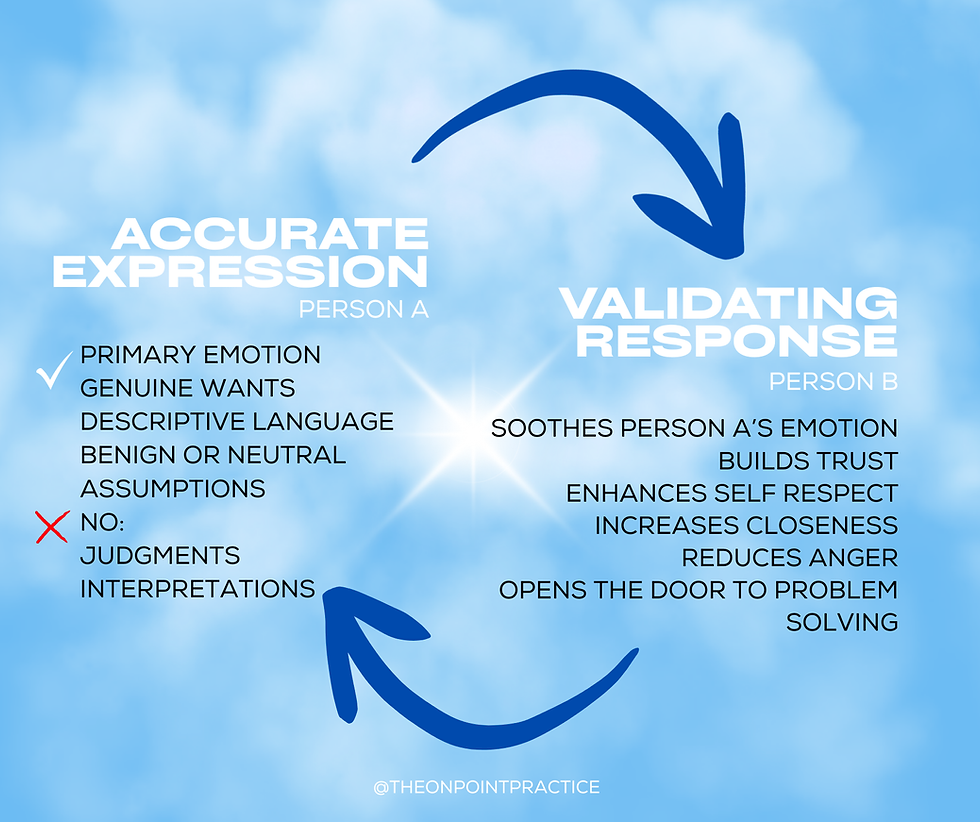Your Guide to Leadership and DBT Terms
- Meredith Meyer

- Sep 25, 2025
- 3 min read
Updated: Dec 5, 2025
Understanding Leadership & Coaching Terms
Grounded Authority – A leadership style that balances confidence with calm emotional regulation. This allows leaders to make decisions from a place of clarity instead of reactive impulses.
Psychological Safety – A team climate where members feel safe to take risks, voice opinions, and admit mistakes without fear of punishment.
Executive Presence – The ability to project confidence, clarity, and credibility in high-pressure leadership situations.
Adaptive Leadership – A model of leadership that emphasizes flexibility, learning, and responding effectively to complex challenges.
Emotional Intelligence (EQ) – The capacity to recognize, understand, and manage one’s own emotions, as well as influence the emotions of others.
Exploring DBT Terms (Applied to Leadership & Life)
Mindfulness – The practice of paying attention, on purpose and without judgment, to the present moment. In leadership, it’s the key to clarity under pressure.
Accurate Expression – A DBT concept that means sharing your internal experience (thoughts, feelings, needs) clearly and truthfully. This strengthens communication and increases the chance of being understood.
Validation – The act of recognizing and affirming another person’s experience as real and understandable, even if you don’t agree with it. This is a cornerstone skill for building trust in teams.
Radical Acceptance – Fully acknowledging reality as it is, rather than fighting against it. Leaders use this to move forward in tough circumstances instead of wasting energy on denial or blame.
Wise Mind – The synthesis of logic (Reasonable Mind) and emotion (Emotion Mind). Leadership decisions are strongest when they come from Wise Mind.
Dialectics – The ability to hold two opposing truths at the same time (e.g., “I can accept myself and work toward change”). This skill is essential in resolving team conflicts.
Hybrid Terms: Where Therapy Meets Leadership
People Problems – Challenges that arise from human behavior in organizations — conflict, miscommunication, burnout — often more difficult than technical or financial issues.
Emotional Regulation for Leaders – Using DBT skills to manage stress, frustration, and reactivity. This helps leaders model resilience for their teams.
Values-Aligned Action – Setting goals and behaviors that reflect core values. This reduces burnout and increases motivation.
Deepening Your Understanding
Want to dig deeper into any of these? Explore our blog posts, sign up for a coaching session, or use this glossary as a reference while you engage with our courses. We’d love to hear which terms you lean on most.

The Importance of Language in Leadership
Language shapes our understanding and interactions. It’s essential for leaders to communicate effectively. When we use the right terms, we foster clarity and connection. This is especially true in high-pressure situations where emotions run high.
By integrating these concepts into your daily practice, you can enhance your leadership skills. Think about how you can apply these terms in your conversations. How might they change the way you approach challenges?
Building a Supportive Environment
Creating a supportive environment is crucial for any team. When team members feel safe, they are more likely to share ideas and take risks. This leads to innovation and growth. As leaders, we must prioritize psychological safety.
Consider how you can encourage open dialogue within your team. Are there practices you can implement to foster a culture of trust?
Embracing Change and Growth
Change is a constant in our lives. Embracing it can lead to personal and professional growth. Leaders who practice radical acceptance can navigate challenges more effectively. They focus on what they can control and let go of what they cannot.
Reflect on your own experiences with change. How have you adapted? What lessons have you learned along the way?
Conclusion: Your Journey Ahead
As you continue your journey in leadership and personal development, remember that language is a powerful tool. The terms in this glossary can guide you in your interactions and decision-making.
Feel free to revisit this glossary whenever you need a refresher. We’re here to support you every step of the way. Let’s embrace this journey together, fostering growth and understanding in all that we do.

.png)



Comments